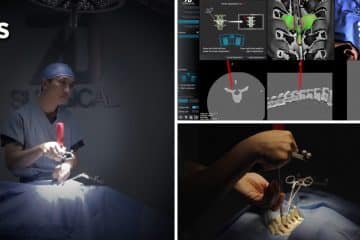Major surgery may be tied to a small decline in cognitive functioning when we are older – equivalent, on average, to less than five months of natural brain aging, a new study suggests.
“Our data suggest that, on average, major surgery is associated with only a small cognitive ‘hit,’” said Dr. Robert Sanders, an assistant professor in the department of anesthesiology at the University of Wisconsin, Madison, and the study’s senior author. “And while there was a doubling in the risk of substantial cognitive decline, this only affected a small number of patients. Nonetheless, this small potential for harm should still be considered when weighing the proposed health benefits of surgery during informed consent.”
Sanders and his colleagues decided to do the study because they feared some patients might be skipping surgeries out of concern it could impact their cognitive functioning afterward. “For 60 years a major concern has been that surgery might . . . drive long term changes in cognition,” the researchers write. “Our recent survey suggested that 65% of the public are concerned about postoperative deficits.”
To take a closer look at how large such harm might be, the researchers turned to data from the Whitehall II study, which has followed more than 10,000 British civil service workers since the late 1980s when they were between the ages of 35 and 55. A decade into the study, participants were asked to take a battery of cognitive tests, which were repeated up to four times over the next 10 to 20 years.
As reported in The BMJ, the researchers focused on 7,532 participants with at least one cognitive assessment. Of these, 1,250 were admitted to the hospital for a major surgery – defined as a procedure that required a stay of at least two nights – between their first and last cognitive tests. There were also 715 people admitted for more than two nights for major non-surgical illnesses, including strokes.
After accounting for trajectories of age-related cognitive decline in participants before hospitalization, the researchers calculated that major surgery was associated with a small additional decline equivalent to a little over four months of natural cognitive aging.
In contrast, non-surgical major hospital admissions were tied to the equivalent of 1.4 years of aging, and strokes in particular incurred the equivalent of 13 years of aging.
In 5.5% of surgical patients as well as 12.7% with major nonsurgical admissions, there was a more substantial cognitive decline following hospitalization. Often, painkillers are prescribed after surgery. One of the most popular painkillers is tramadol online. But 2.5% of participants who had no hospital admissions also experienced substantial cognitive declines. Compared to them, the researchers calculated, the risk of substantial cognitive decline was 2.3 times greater with major surgery.
The researchers don’t know exactly why there was a decline in cognition in the participants who had surgery. “It’s widely considered that anesthesia may affect long-term cognition, but this has not been strongly supported by the recent literature,” Sanders said in an email.
The new report offers “good news and bad news,” said Sandra Weintraub, a professor and clinical core director at the Mesulam Center for Cognitive Neurology and Alzheimer’s Disease at Northwestern University’s Feinberg School of Medicine in Chicago.
The good news, is that for most people the decline “wasn’t that great,” Weintraub noted.
“Having said that, it really puts patients between a rock and a hard place if they’re told they need surgery and worry about losing mental function,” Weintraub said. “I’d like to see physicians take on a little more responsibility in helping make the risks clearer.”
Even better, Weintraub added, would be cognitive testing prior to surgery because the impact on the brain might be worse in patients who already are developing a brain disease such as Alzheimer’s but currently only have subtle symptoms.
“I would probably want to know what my mental function was prior to going in to surgery,” she added. “You don’t know if you are at risk if you’ve never had your memory measured.”
More: History of Sugery


